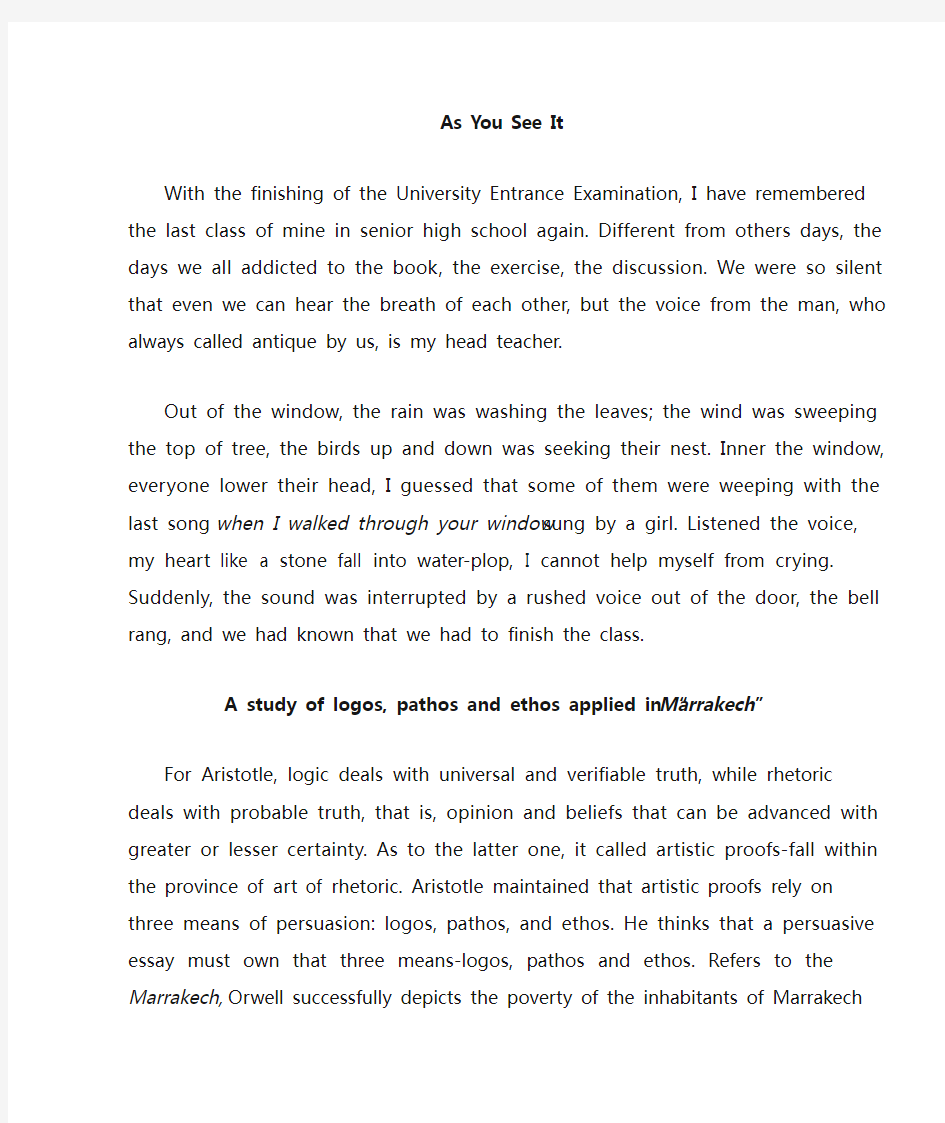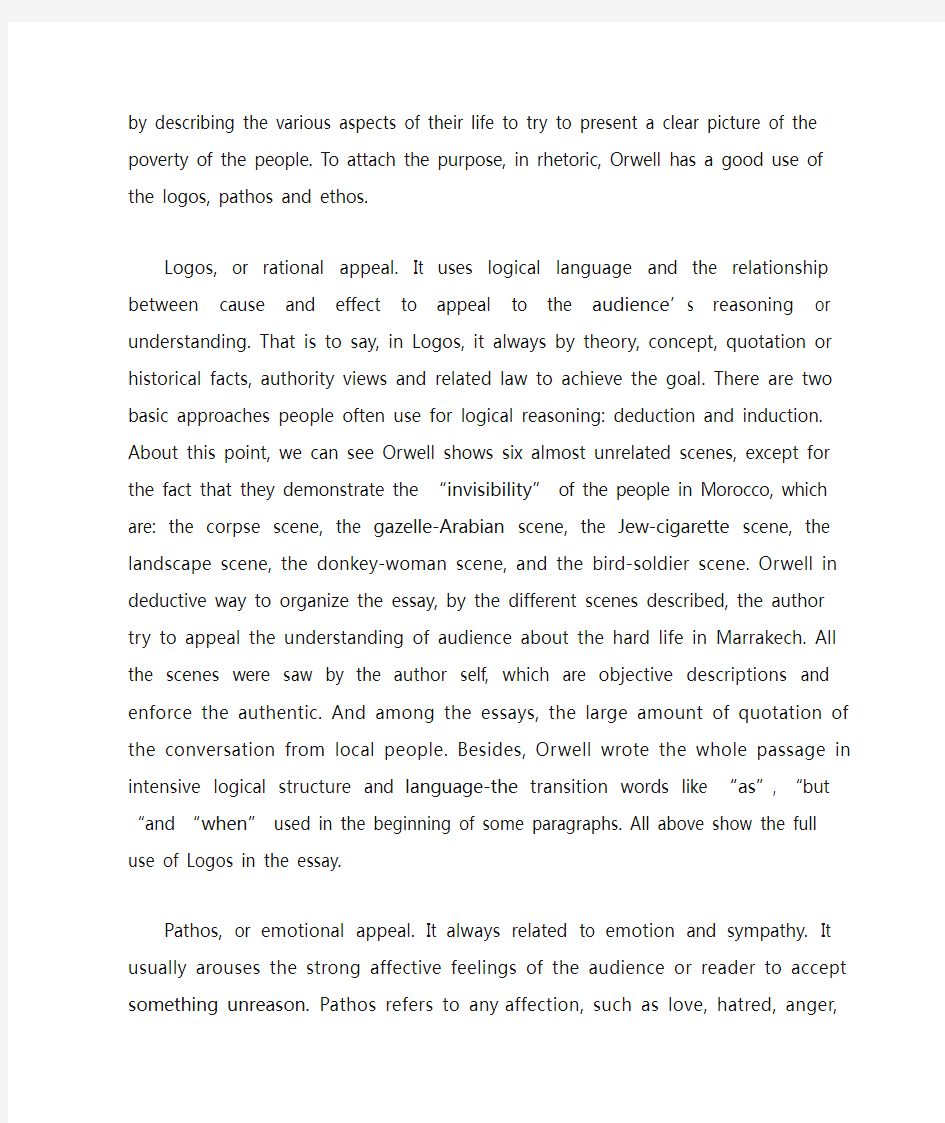

As You See It
With the finishing of the University Entrance Examination, I have remembered the last class of mine in senior high school again. Different from others days, the days we all addicted to the book, the exercise, the discussion. We were so silent that even we can hear the breath of each other, but the voice from the man, who always called antique by us, is my head teacher.
Out of the window, the rain was washing the leaves; the wind was sweeping the top of tree, the birds up and down was seeking their nest. Inner the window, everyone lower their head, I guessed that some of them were weeping with the last song when I walked through your window sung by a girl. Listened the voice, my heart like a stone fall into water-plop, I cannot help myself from crying. Suddenly, the sound was interrupted by a rushed voice out of the door, the bell rang, and we had known that we had to finish the class.
A study of logos, pathos and ethos applied in “Marrakech”
For Aristotle, logic deals with universal and verifiable truth, while rhetoric deals with probable truth, that is, opinion and beliefs that can be advanced with greater or lesser certainty. As to the latter one, it called artistic proofs-fall within the province of art of rhetoric. Aristotle maintained that artistic proofs rely on three means of persuasion: logos, pathos, and ethos. He thinks that a persuasive essay must own that three means-logos, pathos and ethos. Refers to the Marrakech, Orwell successfully depicts the poverty of the inhabitants of Marrakech by describing the various aspects of their life to try to present a clear picture of the poverty of the people. To attach the purpose, in rhetoric, Orwell has a good use of the logos, pathos and ethos.
Logos, or rational appeal. It uses logical language and the relationship between cause and effect to appeal to the audience’s reasoning or understanding. That is to say, in Logos, it always by theory, concept, quotation or historical facts, authority views and related law to achieve the goal. There are two basic approaches people often use for logical reasoning: deduction and induction. About this point, we can see Orwell shows six almost unrelated scenes, except for the fact that they demonstrate the
“invisibility”of the people in Morocco, which are: the corpse scene, the gazelle-Arabian scene, the Jew-cigarette scene, the landscape scene, the donkey-woman scene, and the bird-soldier scene. Orwell in deductive way to organize the essay, by the different scenes described, the author try to appeal the understanding of audience about the hard life in Marrakech. All the scenes were saw by the author self, which are objective descriptions and enforce the authentic. And among the essays, the large amount of quotation of the conversation from local people. Besides, Orwell wrote the whole passage in intensive logical structure and language-the transition words like “as”, “but “and “when”used in the beginning of some paragraphs. All above show the full use of Logos in the essay.
Pathos, or emotional appeal. It always related to emotion and sympathy. It usually arouses the strong affective feelings of the audience or reader to accept something unreason. Pathos refers to any affection, such as love, hatred, anger, ambition, fear, pity, jealously and sympathy, etc. People expressed Pathos by the language content to acknowledge others’ identity or strong emotion. Effective appeals to the audience’s emotion depend upon the skillful, and often witty, handling of language, frequently accompanied by exposure and eloquence. Exposure evokes moral indignation by condemning the unjust reality or revealing the difference between how things should be and how they. Eloquence refers to language used powerfully and fluently to appeal to people’s nobler emotions, like the sense of honor, love of one’s country and hometown, desire to reach toward virtue. Eloquence is often used emotively to express one’s emotions and evoke the sympathy of the audience on solemn occasions or issues of great significance. In Marrakech, Orwell used both of exposure and eloquence to describes the scenes utmost. Orwell tried to denounce the evils of colonialism or imperialism. He mercilessly exposes the poverty, misery and degradation of the native people in the colonies. These people are not considered nor are they treated as human beings. The cruel treatment the donkey receives evokes a greater feeling of sympathy in the breasts of the white masters than the miserable fate of the brown human beings. For example, to present the miserable life of the old women, there is such sentence “Then for the first time I noticed the poor old earth-colored bodies, bodies reduced to bones and leathery skin, bent double under the crushing weight”. Maybe Orwell is hyperbole in this situation, but when reader was caught the sight by this expression, they must have a great appeal for the sympathy. Another description of the corpse scene must have made someone feel sick even fear, but feel sympathy in the end. And the severely life of colonialism was written in this
way “What does Morocco mean to a Frenchman? An orange grove or a job in Government service. Or to an Englishman? Camels, castles, palm trees, Foreign Legionnaires, brass trays, and bandits.”So many examples like this in the essay. Orwell shows the poverty and miserable lives in this way to the reader, catch the emotion of reader properly and finish his purpose perfectly. The last should owe the narrative person is “I”, which gives the reader a true feeling to emerge into the circumstances.
Generally speaking, Marrakech is an excellent narrative works. A good works like that the use of pathos must occupy large ground to conceived the readers.
Ethos, or ethical appeal. It laid the foundation for the people’s credit. It makes others believe the reality of the language through the hero’s attitudes and qualities. In modern rhetoric, ethos refers to the personal standing, academic authority, and moral qualities of the writer, used to guarantee or raise the writer’s credibility and acceptability in the eyes of the readers. In the essay, Orwell presents it mainly through the attitudes I think. The attitudes to travel the area, to talk with the local people, to observe all the scenes cautiously for make the essay more reliable. The Orwell spent several months in Marrakech, Morocco from September 1938 to March 1939. The essay Marrakech must have been written during their stay here. Certainly, people never get to Morocco willing to believe what Orwell said mostly owed to the personnel experience. In Marrakech, Orwell also denounced the colonist, to some extent; they are the killer to kill the happiness of this land. Another reason why Orwell should have the deep feelings about the circumstance is that he once served with the Indian Imperial Police in Burma. He must saw the bad treatment of the people in India from the colonist. So without doubt, the author could write the essay which has a great appeal for the readers.
To sum up, Orwell describes objectively the suffering and misery of the colonial people in Marrakech, yet he manages to show that he is outraged at the spectacle of misery. He succeeds in imparting this feeling to his readers, first, through the clever choice of the scenes he describes; second, through the appropriate use of words; third, through the tone in which he describes these scenes; and finally, by contrasting the indignation at the cruel handling of the donkey with the unconcern towards the fate of the human being. All above, Orwell has a good proportion of logos, pathos, and ethos, especially the use of pathos to arouse the emotion of readers.